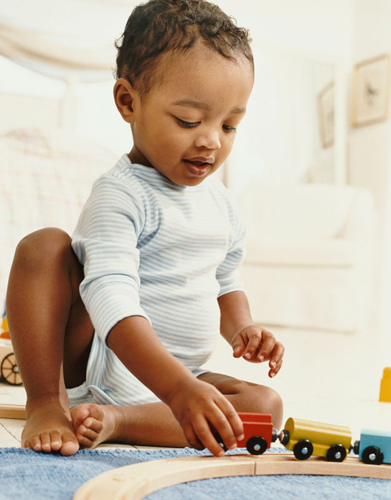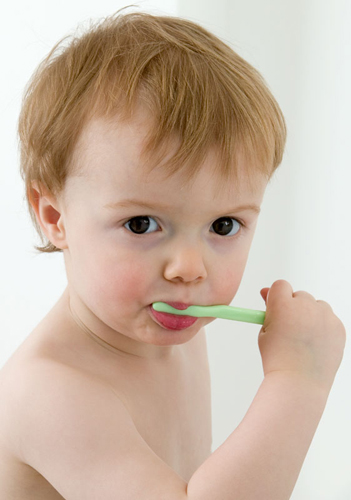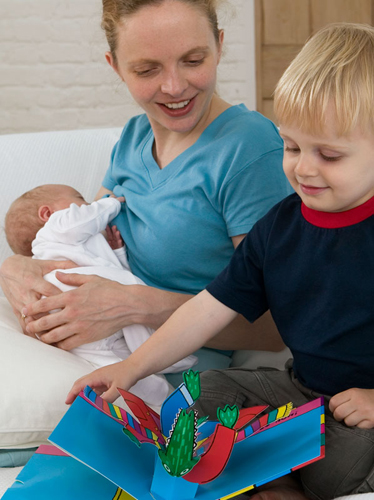In the next six months your toddler will be walking,
and even running, more steadily, freeing her brain to focus on another
vital skill: improving her ability to talk. A great deal of learning
continues to take place through play and almost everything you do will
offer potential for fun and ways to develop new skills.
“Amy is willful and determined, but we love her spirit. We choose our battles wisely, but she knows that ‘No’ means no!”
—“Amy is willful and determined, but we love her spirit. We choose our battles wisely, but she knows that ‘No’ means no!”
“I always remind
people that the toddler of today is the teenager of tomorrow. You owe it
to your child—and to yourself—to put the ground rules in place early.”
“Remember that it is easier
for a toddler to start something new than it is for her to stop what she
is doing. Try saying ‘Walk slowly’, rather than ‘Don’t run’, next time
you want her to stop.”
Since her first
birthday, you will have seen dramatic changes in your toddler’s ability
to move about and during months 18–24 she will become even more steady
on her feet. You will start to see more and more signs of independent
toddler behavior and her need to be heard and understood will increase
steadily. These changes coincide with ongoing brain and memory
development, which means there will be lots of excitable toddler chatter
and she will be learning new words almost every day. Although she will
learn a great deal through play, there is no need for formal lessons or
anything too structured at this stage; overly controlled playtime will
inhibit rather than encourage development.
Children in this age group
are ready to start self-feeding with a spoon (with some extra help from
their fingers); some may enjoy periods of time without diapers; most
are starting to be more inventive and creative in their play, and you
will probably be feeling you have much less time to yourself than you
did when your child was a baby.

Early behavior and routines
Some clear behavior
boundaries will become necessary as your child becomes more
experimental and challenging, not only to help her to stay safe but also
because she is now ready to begin to learn to control her own behavior
and will be able to understand the difference between “Yes” and “No.”
Setting your limits will help her to start to set her own, and to begin
to understand some of the rights and wrongs of social behavior.
By 21–24 months you will
notice a significant difference in your toddler’s reasoning skills and
she will be very eager to “help” you as much as possible, perhaps by
starting to put her toys away. Toddlers are often very enthusiastic
about order and the “rightness” of things. You don’t have to be too
rigid, but this period is the ideal time to introduce more routine and
structure to your child’s day, especially at mealtimes, bedtime, and
getting up time—if you haven’t already done so. She still needs your
help and intervention to manage her behavior, but if she gets used to
the routines now, your life in a few months’ time will be a great deal
easier.
Emotional development
Separation anxiety
will still be a big issue for your toddler during this six-month period
as it coincides with an increase in her ability to reason, and the
development of her imagination. Whereas you were previously able to
leave the house to go to work with no problem, you may suddenly find
that your toddler is distraught, and may weep and cling to you as you
try to leave.
If you are happy with your
child-care arrangements and know that your child is neither ill, nor at
risk, then you can comfort yourself that this is all part of the current
development stage. Young children find partings quite wrenching, and in
the moment of distress will not be able to believe you will be coming
home later. Give your toddler a reassuring hug and explain you will be
home “soon” (or, as she gets older, “when the little hand of the clock
points to the six”). Be understanding, but firm, and don’t delay your
departure (or return). She will soon settle down.
Toddlers are
like miniature teenagers in some ways. They are fraught with rapidly
changing emotions that are very hard to handle. They will be smiley and
giggly one moment and a picture of rage and despair in another. Their
tears are often related to frustration and anxiety but, with
reassurance, will pass very quickly.
At this age your
toddler might find the transition from one activity to another quite a
challenge: getting dressed or undressed may be an issue; saying goodbye
or meeting someone new may be stressful; stopping play in order to eat
may cause tears. This is partly because she is feeling overwhelmed by
change and has an intense desire to be in control of her environment.
Her attention levels are also increasing, so she may become more
distressed than previously when you interrupt something she is enjoying.
She can now focus on a new activity for up to five or seven minutes
without a break, although she is still easily distracted by factors such
as noises, people, bright colors, and movement.
Her relationships
By now, your child will be
able to recognize family members, as well as regular visitors or
friends, and will be able to cope with playing a short distance away
from you. There will be a very strong sense of connection to you and she
will know that she enjoys your attention.
You may also find that she
becomes demanding as soon as you are speaking to someone
else—especially if you are on the phone. You can either distract her by
providing an activity while you complete your task or ignore her
demands, thus giving a clear message that you are not available to her
all the time.
Learning about himself
Asking your toddler to point to body parts gives him a sense of
self-awareness. He’ll realize he’s “like Mommy and Daddy” but that he’s
also his own person.
Signs that development is on track
It is important to emphasize that all children will develop at their own pace, and rarely in constant progression. The following is an approximate guide to how new skills will develop in the coming months.
By the end of months 18–19, your child:
Can probably link together two or three words in a basic fashion (“me dog play”/“Mommy go stairs”).
Will have stopped putting objects in her mouth to explore and learn about them.
Could self-feed if encouraged and may be able to use a spoon or fork as well as her fingers when eating.
Knows and can point to one or two parts of the body, such as her toe or ear, when asked.
May walk into a ball in order to kick it forward.
Can understand, but may not follow, simple instructions.
Will be enjoying imitative play, such as “feeding” a doll.
By the end of months 20–21, your child:
Will be able to throw a ball overarm.
Will be able to scribble with a pencil or crayon.
May be able to speak well enough to be understood half the time.
Can help to undress herself.
Will be able to start helping to brush her teeth.
By the end of months 22–23, your child:
Will be able to use at least six words and understand about 50.
Will be able to walk up stairs, putting both feet on each step, and may be able to kick a small ball forward.
Will be starting to understand prepositions, such as “on,” “in,” and “under.”
Can recognize people she knows at some distance away from them.
By the end of month 24, your child:
Will be starting to undress herself and may be starting to dress herself too (with help).
Can build a tower four blocks high.
Can point at one or two pictures in recognition.
May be able to jump.
Can respond to simple questions, such as “Where is Daddy?”
Self-care
With growing independence, your toddler will want to brush his
own teeth and begin to help to dress himself. Being allowed to try will
increase his self-confidence.

What’s mine is mine
Your toddler is very egocentric
and is becoming much more aware of “me” as a separate person from
“you.” She will be developing a strong sense of ownership and find it
hard to let go of possessions. This is not selfishness so much as a
growing awareness of herself as an individual. Once she is secure in the
knowledge of what is “mine” and “yours” she will become able to share,
but might not want to! The development of self-control will begin over
the course of this year, but at this age she still lacks the ability to
regulate her emotions and will quickly become overwhelmed by her own
feelings and the extreme feelings of others.
And then there were Two…
Just as your toddler is
getting used to the idea that she is the center of your world, as you
are in hers, something happens to transform the family dynamic… there is
a new kid on the block! She will need all your help and understanding
to adapt to this change.
It is fairly common for a new
sibling to arrive while other children are still at the toddler stage.
The arrival of a new baby requires adjustment on all fronts and the
smoothness of the change depends on factors such as how many children
you have, the age differences, any special needs, your health, and your
commitments. But with a happy temperament and effective nurturing, your
children will eventually learn to be cooperative and loving. Older
siblings can play an important part as role models, playmates, and
partners in crime! But this is a long way off yet, and when a new baby
first arrives your toddler may show a range of responses varying from
slight interest to excitement, protectiveness to distress, or
ambivalence to jealousy. None of these is unusual—and all are normal.
Including him
Asking your toddler to “read” a story to Mommy and his baby
brother while you breast-feed is a great way to involve him and have
some family time together.

What about me?
To help your toddler get
used to the idea that a new baby will soon be arriving, involve her in
your preparations. Simple tasks, such as choosing a teddy bear for the
newborn or helping to choose the name, will reinforce feelings of family
belonging, rather than feeling pushed to the side.
Although your toddler may
have been making steady developmental progress, don’t be surprised if
she shows signs of regression, such as using baby talk or wanting to be
breast-fed, when the new baby arrives. This is common behavior, and it
is fine for you to baby her at times as well. She will find it
reassuring to know that she has not been replaced. Now can be a good
opportunity to show her that it can be special to be older. You might
consider moving her out of her crib and into a bed of her own (with side
guards); or if she is still feeding from a bottle you could arrange to
say “bye bye” to the bottle and give her a special cup.
Your toddler will want
and need quality time with you, but beware the trap of feeling you need
to overcompensate for the attention you are paying your new baby, since
this is likely to backfire. Find ways to involve both or all of your
children with one another, rather than trying to slice yourself too
thinly. The more quickly your older child is able to form an early bond
with her new brother or sister, the less likely she is to feel
overwhelmingly jealous or excluded from your world.
Dads play a vital role at
this time because moms are inevitably less available. It is a nice time
for dads to spend more solo time with their children, who may start to
associate Dad with more fun and games. Asking friends and relations to
spend time with your toddler can also offer her more playtime.
Top tips for family adjustment
Praise your toddler to her face and to the new baby while she is with you.
Read bedtime stories to your toddler and make special time to say goodnight to her.
Allow
her to sit on your lap and help “hold” her new sibling. Let her express
her feelings and acknowledge that the noise and mess that go with
having a baby around can be annoying.
Respect your toddler’s space and belongings. Remember, it is normal for her to be very territorial and wary of potential rivals.
Try not to compare your children or to show signs of favoritism.
Be
patient with your toddler’s behavior. It can be easy to label her as
your “bad” child in comparison to your “good” baby, but remember that
she is just adjusting to her new status and will get used to it in time.
Your
toddler is not yet ready or able to take on the role of caring, older
sibling, and deserves to enjoy her toddler phase as long as possible.
Set clear limits on behavior at an early stage. Biting, hitting, punching, pushing, and grabbing should never be tolerated.
Real life
We hadn’t planned to
have another child so soon after the arrival of Justin, who had been
quite a challenging baby. Justin was only 21 months old and still very
clingy when Ed was born. Soon after Ed’s arrival Justin started to bite
me and have tantrums. Ed was a totally different character. Relaxed and
smiley, he was a very easy baby. I tried to spend lots of time with
Justin while Ed was sleeping, but kept him away when he was awake in
case he hurt him. As a result, Justin seemed to crave even more time
alone with me. He started to use baby language when I was with Ed, and
was showing signs of increasing jealousy. My husband and I then realized
it was time to take a different approach, to help the two children to
get used to each other. So we started to bathe them together and to have
family storytime in the evening. We would pay lots of positive
attention to Justin, while encouraging him to help hold and soothe Ed
while we got him ready for bed. I cuddled the children, while my husband
read a story of Justin’s choice. It wasn’t an overnight success, but
they adore each other now. There’s lots of giggles and Justin is very
protective of his baby brother.